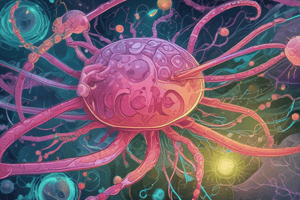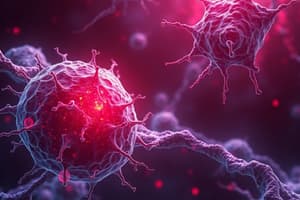Podcast
Questions and Answers
What is the definition of cancer?
What is the definition of cancer?
- Abnormal cell growth and division that can invade and damage surrounding tissues and organs (correct)
- An autoimmune disorder
- A bacterial infection
- A viral infection
Genetic mutations and environmental factors can contribute to the development of cancer.
Genetic mutations and environmental factors can contribute to the development of cancer.
True (A)
What are the three main types of cancers based on cell types?
What are the three main types of cancers based on cell types?
Carcinomas, Sarcomas, Leukemias, Lymphomas
Chronic disease management involves the ongoing, long-term management of diseases that are not __________ by treatment.
Chronic disease management involves the ongoing, long-term management of diseases that are not __________ by treatment.
Match the following genetic disorder types with examples: Autosomal dominant, Autosomal recessive, X-linked, Mitochondrial disorders
Match the following genetic disorder types with examples: Autosomal dominant, Autosomal recessive, X-linked, Mitochondrial disorders
Flashcards are hidden until you start studying
Study Notes
Non-Infectious Diseases
Cancer Biology
- Definition: abnormal cell growth and division that can invade and damage surrounding tissues and organs
- Causes:
- Genetic mutations
- Environmental factors (e.g. radiation, chemicals)
- Infection (e.g. HPV)
- Types:
- Carcinomas (epithelial cells)
- Sarcomas (connective tissue cells)
- Leukemias (blood cells)
- Lymphomas (lymphoid cells)
- Stages:
- Carcinogenesis (initiation, promotion, progression)
- Tumor formation and growth
- Metastasis (spread to other sites)
Nutrition And Disease
- Definition: relationship between diet and health
- Impact of nutrition on disease:
- Macronutrient imbalance (e.g. obesity, diabetes)
- Micronutrient deficiency (e.g. scurvy, anemia)
- Foodborne illnesses (e.g. food poisoning)
- Dietary recommendations:
- Balanced diet with variety of fruits, vegetables, whole grains, and lean proteins
- Limited intake of sugar, salt, and saturated fats
Chronic Disease Management
- Definition: ongoing, long-term management of diseases that are not cured by treatment
- Examples:
- Diabetes
- Hypertension
- Asthma
- Chronic obstructive pulmonary disease (COPD)
- Management strategies:
- Lifestyle modifications (e.g. diet, exercise, stress management)
- Medication adherence
- Regular monitoring and follow-up
Environmental Health Risks
- Definition: exposure to environmental factors that can cause disease
- Examples:
- Air pollution (e.g. particulate matter, ozone)
- Water pollution (e.g. heavy metals, pesticides)
- Soil pollution (e.g. lead, radon)
- Climate change
- Health effects:
- Respiratory problems (e.g. asthma, COPD)
- Cancer
- Neurological damage
- Birth defects
Genetic Disorders
- Definition: diseases caused by genetic mutations or abnormalities
- Types:
- Autosomal dominant (e.g. Huntington's disease)
- Autosomal recessive (e.g. cystic fibrosis)
- X-linked (e.g. hemophilia)
- Mitochondrial disorders (e.g. Kearns-Sayre syndrome)
- Inheritance patterns:
- Mendelian inheritance
- Non-Mendelian inheritance (e.g. genomic imprinting, mosaicism)
Cancer Biology
- Cancer is defined as abnormal cell growth and division that can invade and damage surrounding tissues and organs
- Causes of cancer include genetic mutations, environmental factors such as radiation and chemicals, and infection
- Types of cancer include carcinomas, sarcomas, leukemias, and lymphomas
- Stages of cancer development include carcinogenesis, tumor formation and growth, and metastasis
- Carcinogenesis involves initiation, promotion, and progression
Nutrition And Disease
- Nutrition plays a critical role in disease prevention and treatment
- Macronutrient imbalance can lead to obesity and diabetes, while micronutrient deficiency can cause scurvy and anemia
- Foodborne illnesses such as food poisoning can occur due to contaminated food
- A balanced diet with variety of fruits, vegetables, whole grains, and lean proteins is recommended
- Limited intake of sugar, salt, and saturated fats is advised
Chronic Disease Management
- Chronic diseases require ongoing management and are not cured by treatment
- Examples of chronic diseases include diabetes, hypertension, asthma, and chronic obstructive pulmonary disease (COPD)
- Management strategies include lifestyle modifications, medication adherence, and regular monitoring and follow-up
Environmental Health Risks
- Environmental health risks include exposure to air, water, and soil pollution
- Examples of environmental health risks include air pollution, water pollution, and climate change
- Health effects of environmental health risks include respiratory problems, cancer, neurological damage, and birth defects
Genetic Disorders
- Genetic disorders are diseases caused by genetic mutations or abnormalities
- Types of genetic disorders include autosomal dominant, autosomal recessive, X-linked, and mitochondrial disorders
- Examples of genetic disorders include Huntington's disease, cystic fibrosis, hemophilia, and Kearns-Sayre syndrome
- Inheritance patterns of genetic disorders include Mendelian and non-Mendelian inheritance
Studying That Suits You
Use AI to generate personalized quizzes and flashcards to suit your learning preferences.





